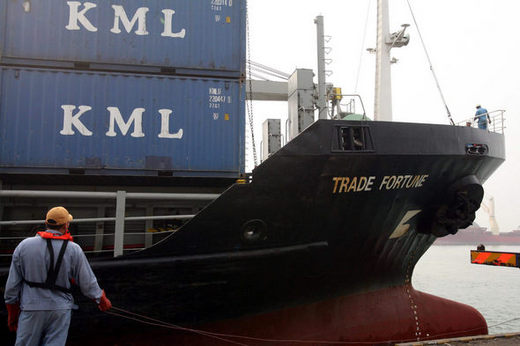 |
|
A cargo ship that brought aid supplies given by civic groups to North Korea - the first since Pyongyang’s nuclear test - returns to Incheon on October 17.
|
Blue House anticipates further difficulty in compromising on North
With signs detected that North Korea may be preparing a second nuclear test, the South Korean government is bracing for what is to come. For if Pyongyang conducts another test, the possibility for Seoul to justify continuing inter-Korean economic projects, as well as avoiding joining the U.S.-led Proliferation Security Initiative (PSI), will be all the more difficult. An official of the Ministry of Foreign Affairs and Trade said on October 17, "If North Korea conducts a second nuclear test, it will be a direct challenge to the U.N. resolution. Therefore, the isolated nation will face worldwide pressure. Our government will also be in serious trouble." "The second nuclear test will lead to further sanctions from the international community and U.N. measures against the North will also be strengthened," said another ministry official, adding, "In that case, we will have to demonstrate a more hard-line stance." Both officials spoke on condition of anonymity, citing the sensitivity of the topic. If the North tests a second nuclear device, Washington and Tokyo will likely demand that Seoul fully join the PSI, which is meant to stop the spread of weapons of mass destruction through the intense inspection of shipping cargo. Seoul has so far been at "observer" status in regards to the PSI, as it fears direct confrontation with the North if it should try to enforce the initiative.Regarding this, an official at the presidential office said on condition of anonymity, "Persons who raise issues regarding [South Korea’s need to join] the PSI clearly are not aware of the inter-Korean maritime transportation agreement." According to the agreement, which took effect in August 2005, neither of the two Koreas can ship weapons or related parts within each other’s waters; any ship can be searched by either side to guarantee non-violation of this agreement. The South Korean government says this arrangement is similar to the PSI. Another high-ranking official of the government, also on condition of anonymity, said, "We will decide on our level of participation in the PSI depending on its necessity in accordance with the U.N. Security Council Resolution 1718." Seoul’s position has been that its own maritime agreement with the North, forged through what it calls a mutual understanding between the two nations, is preferable to the U.S.-led PSI. Washington and Tokyo are also expected to demand that Seoul halt inter-Korean economic cooperation projects, such as the Mt. Geumgang tours and Gaeseong (Kaesong) Industrial Complex, in the wake of a second test. Regarding the fate of inter-Korean projects, the official at the presidential office said, "As the U.N. resolution against the North gives each nation a good deal of discretion [as to how to carry out the requirements], at the current stage we judge that the nuclear crisis doesn’t have direct bearing on the two key projects of inter-Korea economic cooperation [Mt. Geumgang and Gaesong]. If Pyongyang conducts another test, however, the situation will be different." Seoul knows it must be careful to follow the moves of the international community on the matter. If the U.N. Security Council demands stronger sanctions - such as the suspension of South-North economic cooperation programs and financial transactions - South Korea should follow its requests. Prof. Kim Yeon-cheol of Korea University said, "If North Korea tests another nuclear weapon, the U.S. is likely to push ahead with a resolution that would include the complete suspension of trade with North Korea and direct military sanctions, which, much like similar proposals floated by Japan, would affect inter-Korea economic cooperation projects." However, if the South Korean government puts a halt to the Mt. Geumgang tours and Gaeseong industrial park under pressure from the U.S. alone, at a time when there is no resolution which completely bans all trade with North Korea, the government may have to compensate private companies for losses, he said. Meanwhile, regarding the situation, the official at the presidential office said, "Our obvious position is that our goal is not the collapse of the communist nation through blockades. We should let North Korea know this, in order to bring it back to the six-party talks and persuade Pyongyang to scrap its nuclear weapons through dialogue."






